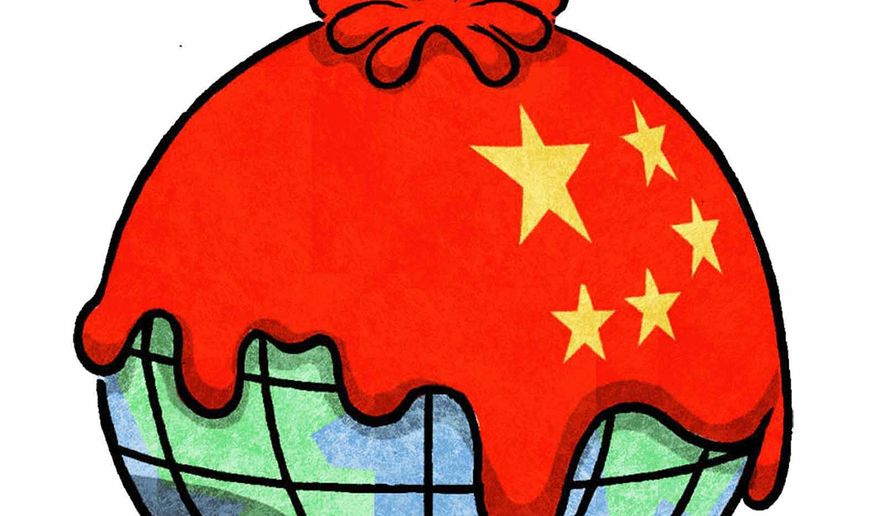OPINION:
It’s become common to speak of the “U.S.-China rivalry” or the “U.S.-China competition” — phrases that suggest a game, something like the World Cup, with one nation winning today and another tomorrow.
Xi Jinping, the most powerful Chinese ruler since Mao Zedong, doesn’t see it that way. He believes that a Stalinist-Maoist “struggle” is underway — a struggle to determine whether the global democratic experiment is to survive or whether the Chinese Communist Party (CCP) is to become the global hegemon.
To understand this, you needn’t read Mr. Xi’s mind — just his speeches and official communications.
Three eminent scholars Matt Pottinger (affiliated with FDD and the Hoover Institution), Matthew Johnson (also at Hoover) and David Feith (of the Center for a New American Security) have been doing that.
“Xi Jinping in His Own Words: What China’s Leader Wants — and How to Stop Him From Getting It,” published last week in Foreign Affairs, confirms Mr. Xi’s “hostility toward the United States.” More broadly, his “explicit objective” is “to replace the modern nation-state system with a new order featuring Beijing at its pinnacle.”
To achieve this goal, he is utilizing all instruments of Chinese national power. One major initiative is called “A Community of Common Destiny for Mankind.”
Messrs. Pottinger, Johnson and Feith note that the “ominous-sounding term ‘common destiny’ is often misleadingly translated by the CCP into the more anodyne English phrase ‘shared future.’”
But what Mr. Xi foresees is nothing less than “Marx’s vision of a stateless, collectivized world,” one in which the CCP “will mold the interests of the Chinese people and those of the world’s people together.”
China’s “ideology and social system,” Mr. Xi believes, “are fundamentally incompatible with the West.” He has said: “This determines that our struggle and contest with Western countries is irreconcilable, so it will inevitably be long, complicated, and sometimes even very sharp.”
Sharp implies violent. He has added: “To use war to protect our national interests is not in contradiction with peaceful development. Actually, such is a manifestation of Marxist strategy.” That tells you all you need to know about why Mr. Xi is aggressively building his country’s military capabilities.
Also on his to-do list: developing and selling technologies that enable government control and manipulation of both domestic and foreign populations. Last week, Craig Singleton, a senior fellow at FDD, published a study of Tiandy Technologies. Though, in theory, a private company under Mr. Xi’s “military-civil fusion” policy, it takes orders from the CCP. Its chief executive, Dai Lin, serves as the company’s CCP secretary.
“Both Tiandy testimonials and Chinese government press releases advertise the use of the company’s products by Chinese officials to track and interrogate Uyghur Muslims and other ethnic minorities in China’s Xinjiang province,” Mr. Singleton writes. Tiandy also sells its products to Tehran and Moscow.
The Chinese telecom giant Huawei is involved in surveillance on a wider scale. The U.S. Department of Justice has charged Huawei with “racketeering conspiracy and conspiracy to steal trade secrets.” Last month, the Federal Communications Commission announced a ban on sales of Huawei equipment, citing “an unacceptable risk” to national security.
And hiding in plain sight is TikTok, a wildly popular social media platform now being used to collect data on more than 100 million Americans.
Downloading TikTok on your phone gives the CCP the ability to track not only other websites you access but also your search and browsing histories and even your key swipes when on those sites.
American Enterprise Institute senior fellow Klon Kitchen explained what that means on last week’s “What the Hell Is Going On?” podcast. “They know your username, and they know your password, and they know texting content,” he said, adding that they can even access biometric identifiers and whatever else is on a device’s clipboard.
Mr. Pottinger and his co-authors note that TikTok’s algorithms can be “modified to suppress or amplify content according to the CCP’s preferences, which would give China the ability to influence the views of tens of millions of Americans.”
In simple terms, the huge amounts of data being collected can be used to manipulate Americans’ thinking and opinions. It’s a great technological leap forward from the “dezinformatsiya” campaigns developed by the KGB’s black propaganda department decades ago.
Speaking last week at the University of Michigan, FBI Director Christopher Wray said there is no “more serious, more persistent threat to our innovation, our ideas and our economic security than the Chinese Communist Party and the Chinese government.”
There’s more, of course, including Beijing’s role in manufacturing and trafficking fentanyl across our southern border, its “strategic mercantilism,” including purchases of U.S. farmland (often near military bases), and control of supply chains on which Americans depend.
What can be done? Much more than the Biden administration — or any previous administration — has done. For example, TikTok should be banned. Tiandy should be sanctioned. President Biden should rethink his decision to shut down the FBI’s “China Initiative” — its effort to investigate U.S.-based professors suspected of transferring proprietorial research.
Mr. Biden has said several times that the U.S. will defend Taiwan if necessary. But without increased spending to elevate American military capabilities and readiness, Mr. Xi is unlikely to be deterred — or defeated, should push ever come to shove.
More comprehensively, Mr. Pottinger and his co-authors envision “constrainment.” Though not quite the containment policy the U.S. adopted toward the Soviet Union during the Cold War, it “bears a family resemblance.”
Such a policy “should seek to puncture Beijing’s confidence that it can achieve its aims through war and sap Beijing’s optimism that it can decisively accumulate coercive economic leverage over the United States and other democracies.”
The first step: Clear and unequivocal recognition that Mr. Xi isn’t playing games.
• Clifford D. May is founder and president of the Foundation for Defense of Democracies (FDD) and a columnist for The Washington Times.




Please read our comment policy before commenting.